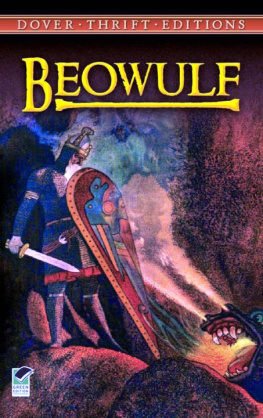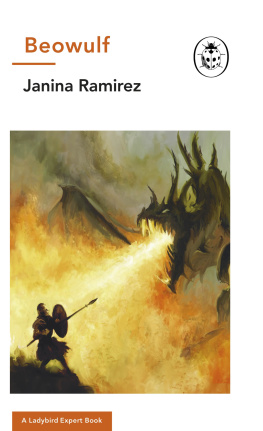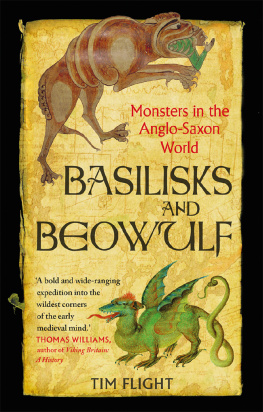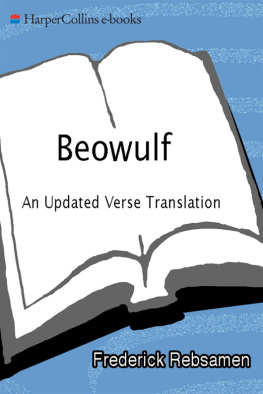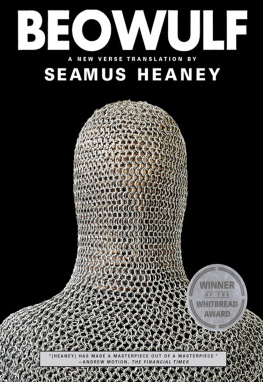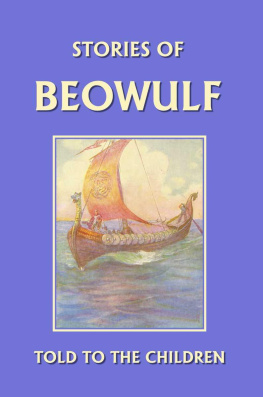




ARGUABLY THE GREATEST ACHIEVEMENT of Old English literature, Beowulf was composed by an unknown, possibly Northumbrian, poet during the eighth century, and is the earliest extant heroic epic in any European vernacular. It has been preserved in a single manuscript, dating from about 1000 A.D. The work was written in Old English alliterative verse, predating the influence of the French language and literature, which began with the Norman Conquest. The present translation, by R. K. Gordon, is sensitive to the syntactic complexity of the original and preserves the many kennings (or compounds) so intrinsic to Anglo-Saxon poetry.
The events described in Beowulf are set in the sixth century, and already belonged to a lost "heroic age" at the time of original composition. Stylistically and thematically, the poem belongs to the Germanic heroic tradition, with its emphasis on fealty, courage and vengeance for crimes against one's family or community. The poem contains references to Weland, the smith of Teutonic legend, and to Sigemund, the Volsung. Alongside these pagan elements is a strain of Christian sentiment often argued to be a revision of the original poem. Whether or not that is the case, the elegiac tone and the sense of wyrd (fate) are so dominant (the outcome of events is often described before the events themselves) that the poem maintains a compelling unity.
The narrative itself falls into two halves: the first part takes place in Denmark where, coming to the aid of King Hrothgar, Beowulf fights the monsters Grendel and Grendel's mother (said to be descended from the outcast Cain). The second part is set in southern Sweden where, after the death of King Hygelac and his son, Heardred, Beowulf has ruled in peace and prosperity for 50 years before being called upon to combat a dragon that is terrorizing the country after having its treasure hoard looted.
Beowulf blends a fairy-tale narrative-Grendel, his mother and the fire-breathing dragon-with considerable historical material. Although Beowulf is not himself an historical figure, his lord, Hygelac, King of the Geats (or Weders), was a southern Swedish king who fell in battle in the Rhineland between 512 and 520 A.D. The Danish King Healfdene, Hrothgar's father, is also probably historical. His mead hall, Heorot (which means "hart," referring possibly to antlers positioned above the hall's entrance), was situated on the island of Sjaelland. - - - -- - - - - - - -
Genealogical tables have been provided to help the reader grasp the sometimes complicated relations between the Danish, Geat and Swedish royal families in the poem.
DANISH ROYAL FAMILY
Lo! we have heard the glory of the kings of the Spear-Danes in days gone by, how the chieftains wrought mighty deeds. Often Scyld-Scefing wrested the mead-benches from troops of foes, from many tribes; he made fear fall upon the earls. After he was first found in misery (he received solace for that), he grew up under the heavens, lived in high honour, until each of his neighbours over the whale-road must needs obey him and render tribute. That was a good king! Later a young son was born to him in the court, God sent him for a comfort to the people; He had marked the misery of that earlier time when they suffered long space, lacking a leader. Wherefore the Lord of life, the Ruler of glory, gave him honour in the world.
Beowulf, son of Scyld, was renowned in Scandinavian lands-his repute spread far and wide. So shall a young man bring good to pass with splendid gifts in his father's possession, so that when war comes willing comrades shall stand by him again in his old age, the people follow him. In every tribe a man shall prosper by deeds of love.
Then at the fated hour Scyld, very brave, passed hence into the Lord's protection. Then did they, his dear comrades, bear him out to the shore of the sea, as he himself had besought them, whilst as friend of the Scyldings, loved lord of the land, he held sway long time with speech. There at the haven stood the ring-prowed ship radiant and ready, the chieftain's vessel. Then they laid down the loved lord, the bestower of rings on the bosom of the barge, the famous man by the mast. Many treasures and ornaments were there, brought from afar. I never heard of a sightlier ship adorned with weapons of war and garments of battle, swords and corslets. Many treasures lay on his bosom that were to pass far with him into the power of the flood. No whit less did they furnish him with gifts, with great costly stores, than did those who sent him forth in the beginning while he was still a child alone over the waves. Further they set a golden banner high over his head; they let the ocean bear him; they surrendered him to the sea. Sad was their mind, mournful their mood. Men cannot tell for a truth, counsellors in hall, heroes under the heavens, who received that burden.

Then Beowulf of the Scyldings, beloved king of the people, was famed among warriors long time in the strongholds-his father had passed hence, the prince from his home-until noble Healfdene was born to him; aged and fierce in fight, he ruled the Scyldings graciously while he lived. Four children sprang from him in succession, Heorogar, prince of troops, and Hrothgar, and Halga the good; I heard that Sigeneow was Onela's queen, consort of the war-Scylfing. Then good fortune in war was granted to Hrothgar, glory in battle, so that his kinsmen gladly obeyed him, until the younger warriors grew to be a mighty band.
It came into his mind that he would order men to make a hallbuilding, a mighty mead-dwelling, greater than ever the children of men had heard of; and therein that he should part among young and old all which God gave unto him except the nation and the lives of men. Then I heard far and wide of work laid upon many a tribe throughout this world, the task of adorning the place of assembly. Quickly it came to pass among men that it was perfect; the greatest of hall-dwellings; he whose word had wide sway gave it the name of Heorot. He broke not his pledge, he bestowed bracelets and treasure at the banquet. The hall towered up, lofty and wide-gabled; it endured the surges of battle, of hostile fire. The time was not yet come when the feud between son-in-law and father-in-law was fated to flare out after deadly hostility.

